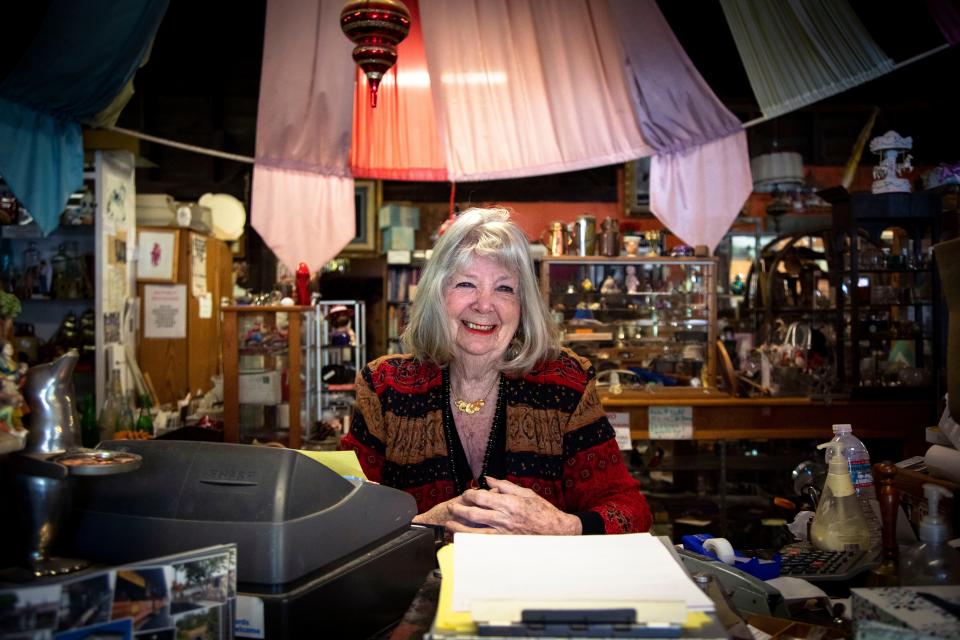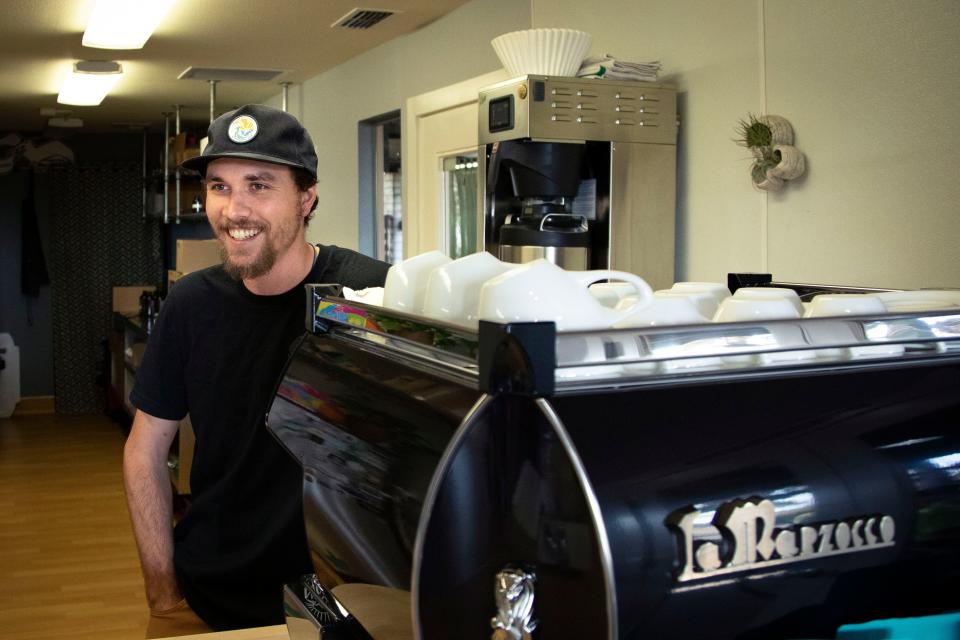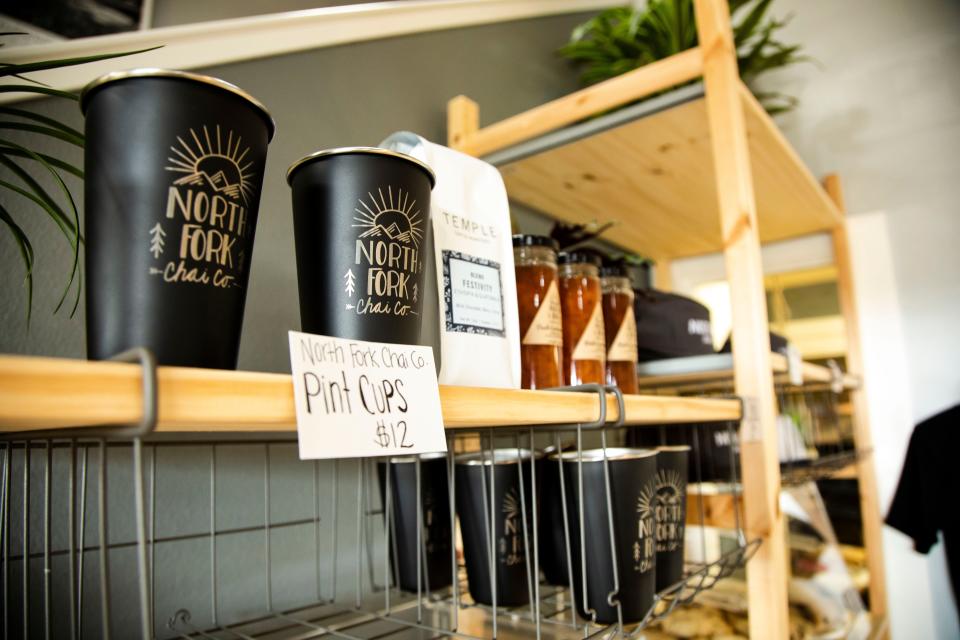This California town has the slowest internet in the U.S.
Drivers cruise by on Interstate 80 — a busy artery that cuts across Northern California — never knowing they passed through the town of Newcastle.
The unincorporated rural community tucked into the foothills a half-hour drive from Sacramento is home to more than 1,200 people and several fruit orchards. Hailed as an important stop on a newly built transcontinental railroad in 1864, the town's reputation was built around its produce production.
Newcastle has retained its historical charm. The centuries-old landmarks, narrow country roads that weave through hillside homes, and vintage storefronts are from a different era. But that's not what's most remarkable about this California town, nestled amid bustling tech centers.
Even though it is mere hours from Silicon Valley — Newcastle has the slowest internet in the country.
It is one of the many rural communities across the nation on the edges of a digital divide that has been growing wider for decades. While most metro areas are adopting the latest innovations in communication technology and setting the standards for connectivity, rural residents are often left with outdated options or are unable to get online in their homes and businesses.
Despite Newcastle's proximity to high-speed hubs the town’s speed averages 3.7 megabits per second, according to tests done HighSpeedInternet.com, a company that offers consumer information on Internet Service Providers. For comparison, average internet speeds are closer to 160 Mbps roughly 100 miles south in San Francisco.
Many people in Newcastle don’t even have access to the internet. Nearly 30% of households in town don’t have a broadband subscription, according to the latest census data.
Communities struggling to keep pace with digital development face many hurdles. Slow speeds have been found to limit business growth and are associated with higher rates of unemployment. New tools, including telehealth options that save lives when doctors are sparse, and farming innovations that save money and resources, are largely unavailable. It is also harder to get essential safety updates during fast-moving wildfires or other emergencies. And students in rural communities often lag far behind their city-living counterparts, who learn in connected classrooms.
Newcastle's economy has struggled in recent years. Roughly 12.4% of the small town's locals live in poverty and incomes are falling. Workers on average earn far less than in surrounding areas. At just over $38,000, the median income is roughly 34% less than the national average and 53% lower than all of Placer County.
“It’s pretty well known that an internet connection these days is vital to getting a job, applying for school, even kids who are trying to do their homework and they need to do a lot of research,” said Victoria Smith, a staff researcher at SatelliteInternet.com, which compiled the speed tests into a report.
“We were hearing a lot of buzz words from providers and advertisements saying 5G is coming, super-fast internet is coming,” she adds, saying that new innovative models and options, like 5G and low-satellite internet, could soon roll out in metro cities. “It is great that these metro areas are going to get super-fast internet but people who live in rural areas — do they even have enough internet to do basic things?"

A town from another time
Jim Anderson, who owns an antique store in a 100-year-old fruit-packing warehouse on Main Street says he doesn’t care much about internet. Service has always been bad. He calls his town and shop — where he sells “cool junk” — the “end of the railroad.” After living there for 40 years, things have more or less always stayed the same.
“Phones don’t work — but no one really cares,” he said. Instead, locals come by his store or the Newcastle Cheese Shop next door (home to the locally famous, Rat-trap sandwich) to get the latest. “I always say, 'I don’t know whose time your killing, yours or mine,' ” he jokes.
His is one of two antique stores in the center of town. The other belongs to Ingrid, an 85-year-old former British model. Her business “Merry-Go-Round Merchandise,” a maze of odds and ends, vintage furniture and art, is aptly decorated with bright fabric. She shares that after stints in big cities New York, San Francisco and Los Angeles, “a few husbands later” she ended up in Newcastle with the store.
She enjoys slow life in a small town and hopes it stays that way, even though her chosen trade of brick-and-mortar shopkeep has fallen victim to the very technology many in the town eschew.
“Internet kills my business,” she said explaining that people can get things online or use their phones to check for better prices. “Some days I don’t have a single sale.”
Not all the stores in the tiny downtown sell antiques. Down the road and across the highway, North Fork Chai, a coffee shop with modern décor that could easily cater to San Francisco customers, offers pastries, beverages and cooking classes from Chelsea Bruce, the Culinary Institute of America-trained chef who owns the establishment with her brother Josh Hedrickson.

On an autumn morning, the space is filled with a group of Lycra-clad cyclists, couples chatting and regulars with requests.
“I see there are no cinnamon buns,” an older man says at the counter raising an eyebrow. Hendrickson pauses from the latte he is making and with a laugh promises to pass the message along to his sister, who makes the baking decisions.
“I know everybody,” he says. “If you live in Newcastle everybody knows each other for sure. It is crazy tight.”
His family has lived in the town since the beginning when his great-grandfather ran a fruit farm. He lives on 10 acres of land nearby and also raises sheep. The redwood tops on his land can be seen from the coffee shop’s window.
“It is definitely not what people would think of typical California,” he said, adding that the shop provides internet but otherwise it's hard to come by. While he is grateful for the zoning laws that help preserve the sprawling landscapes, he said many people are moving away or passing away and he has seen an influx of newcomers to town who are moving from the Bay Area, who want to work remotely.
He expects it won't be easy.

The problem extends across California. With big cities becoming more expensive, telecommuters looking for a new lifestyle may be limited by internet offerings. The Rural County Representatives of California, a service organization that advocates for 36 rural counties across the expansive state, reports that less than half of its households have access to high-speed broadband. Across the U.S., close to a quarter of rural adults report that broadband access is a major issue in their community, according to a 2018 Pew Research Center Survey.
The issue stems from both financial disinterest on the part of providers, who don't invest in the infrastructure when homes and businesses are remote and built on rugged terrain.
Governments are trying to bridge the digital gap
Federal agencies, including the Federal Communications Commission and the USDA, have made connectivity a priority, and state and local governments are also coalescing with new plans to bridge the gap.
Earlier this month, California Gov. Gavin Newsom shared at the 2019 Economic Summit in Fresno that he is working on a “Broadband for All” plan for the state, and has started to build a coalition of stakeholders in both government agencies and private sector.
“We see more businesses start here than anywhere else in America – including many that go on to become industry leaders thanks to our innovative spirit, world-class colleges and universities, state-of-the-art labs, and a truly diverse workforce,” Newsom said. “But this growth is not shared across the entire state – it’s heavily concentrated along our coast.”
As part of its $1.5 billion Connect America Fund Phase II, the FCC has already allocated $133 million to financing faster broadband options in rural California over the next 10 years.
“At the end of the day, broadband provides countless opportunities whether it is professional, economic, social, political, educational, health care — the list goes on and on,” Preston Wise, special counsel at the FCC said, adding that the agency wants to ensure young people can move back or remain in rural America without sacrificing opportunities. “Giving Americans these options and putting everyone in the country on the same level is of such critical importance.”

The FCC made moves in August to secure an additional $20.4 billion with a new Rural Digital Opportunity Fund. Wise says this is the commission’s single biggest step yet to try to close the digital divide, with aims to provide broadband to 4 million more Americans in the next 10 years.
But some are concerned that the decade it will take to implement is too slow to keep pace with the speed of technological innovation.
“It is impossible to predict exactly how this will change in the next 10 years, but we are taking steps right now to do what we can to get in front of that,” Wise said, explaining they are already eliminating the slowest speed — 25 Mbpg — from the auction to incentivize better options for funded areas.
Not everyone agrees, however, that it’s the government’s role to provide the incentives.
Monica Anderson, an Associate Director of Research at Pew, said surveys show that many who would benefit most don’t support governmental subsidies.
“Only 36% of rural adults said the government should provide subsidies to help lower-income Americans,” she said. “We also see a big party difference here,” she adds. The rural areas that tend to be politically red, are less likely to seek assistance. “Republicans are more likely to say broadband is affordable enough,” she says.
Some communities want to expand access, but not through investments from federal agencies or big telecom companies.
“In a 2017 survey that looked at attitudes toward municipal broadband, a majority of Americans are in favor of local communities being able to build their own internet networks,” Anderson said.
Some cities want to go their own way
'Thirty-two miles northeast from Newcastle, the quaint mining town-turned-tourist-paradise of Nevada City also made the top 10 slowest-speeds list. There, the average internet speed is 6.7Mbps — but city officials have resisted intervention.
“I just do not believe the FCC has our best interest in mind,” said Nevada City Mayor Reinette Senum. “To have a corporation come in and say we are going to take over is a dangerous precedent that could leave us with no local authority."
She wants the city to have great internet but on specific terms — and she doesn’t think wireless is the way to go. She wants everything underground and owned by the city.
“We have high winds, we have fires, we have floods,” she adds. She has personally decided to plug back into her modem at home and take calls from a landline. “I have a long chord and it’s 20 feet long. I have another that is 50 feet long,” she said. “You just have to get used to moving it around.”
Insisting she is not a Luddite, Senum said what it really comes down to is local well-being: Balancing the needs of being connected with preserving the quality of life that makes places like Nevada City and Newcastle unique. Besides, she adds, they aren’t trying to be the next Silicon Valley or San Francisco.
“Nevada City is where you come to unplug. It is where you come to slow down. It is an unusual place where you can actually get a sense of community,” she says. “We want to ensure we have this lovely quality in our community and we keep it there.”
Gabrielle Canon is USA Today's California reporter based out of Sacramento. Contact her at gcanon@gannett.com or on Twitter @GabrielleCanon
Loading...
This article originally appeared on USA TODAY: This California town has the slowest internet in the U.S.

